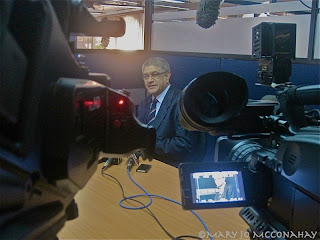Too strange for words, to hear once more the reasons for the charge of genocide read in the grand courtroom, five weeks after they were first articulated on Mar. 19, opening day of the landmark trial. After a judge from another court caused the process halted on a technicality on April 18, the trial went into suspension. When it opened again on April 30, certain changes had been made from the day it stopped, so the charge had to be restated.
 The same accused sit at the defense table, former head of state Gen. José Efraín Rios Montt and his intelligence chief, Gen. Mauricio Rodriguez. What’s different this time: more than 120 witnesses have already testified, so that each time elements of the genocide charge rang out -- “sexual violence, individual and collective,” “burning of houses, schools”-- the images of witnesses who testified to them arose in the mind, their voices heard once more.
The same accused sit at the defense table, former head of state Gen. José Efraín Rios Montt and his intelligence chief, Gen. Mauricio Rodriguez. What’s different this time: more than 120 witnesses have already testified, so that each time elements of the genocide charge rang out -- “sexual violence, individual and collective,” “burning of houses, schools”-- the images of witnesses who testified to them arose in the mind, their voices heard once more.  The women allowed to partially hide their identities, heads covered with cloths woven in shades of red, speaking in Ixil through an interpreter, their draped figures ramrod straight as if to endure the recounting without folding in two, or shaking. The man of age 70 who cried for his parents.
The women allowed to partially hide their identities, heads covered with cloths woven in shades of red, speaking in Ixil through an interpreter, their draped figures ramrod straight as if to endure the recounting without folding in two, or shaking. The man of age 70 who cried for his parents.
Once again, Gen. José Efraín Rios Montt, fit-looking at age 86, walked to the witness stand to state the details of his identification, place of birth. Survivors stared, faces
grim. The presiding trial judge, Jazmín Barrios, spoke clearly, denying defense requests that would have caused delays or another suspension. Once again, the trial was on.

In a chilling image by photographer Estuardo Paredes that appeared in today’s Prensa Libre, a Guatemala City daily, Judge Barrios is seen walking from her chambers sans jacket, revealing a bullet-proof vest.






































